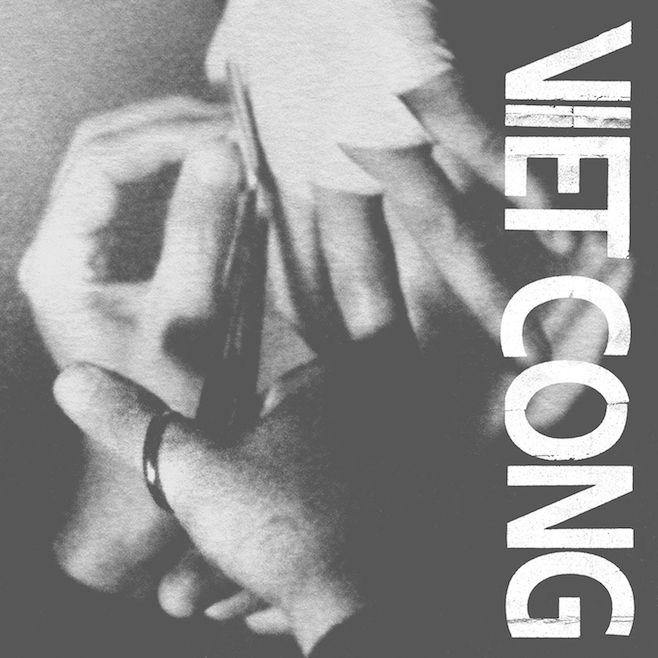Viet Cong’s debut a visceral fusion of ugliness and beauty
January 14, 2015
Viet Cong
Viet Cong
Grade: A
Viet Cong have a reverence for menace — the particular dynamic of pain and pleasure that they display on their wiry self-titled debut makes this much obvious. Arising from the ashes of the much-missed Women, this Albertan art-rock quartet co-opts agony into songs that are wild, ominous and stunningly gorgeous. In other words, their regrettably inflammatory band name is a lot more Francis Ford Coppola than it is Ken Burns. Viet Cong is their high-energy tour through the war-torn wasteland of modern life.
The album begins with the martial trash can drumming and ghastly screeches of “Newspaper Spoons,” a song appropriately named after William S. Burroughs’ term for the arbitrary moral guidelines that a culture constructs to obscure its obscene and hateful underpinnings. This song reveals the basic elements of the band’s style: needly guitars, muscular drumming, murky production and the monolithic presence of frontman Matt Flegel, whose fondness for the polysyllabic language of bureaucracy acts as a sort of newspaper spoon for otherwise visceral songs. Flegel croons like Bowie at his most detachedly coked-out, with lyrics like “overdeveloped in incompetent ways” or “failed to keep the necessary papers for evacuation.” This way, he can provide a sublimely unfeeling foil for the death-wails and banshee screeches of his bandmates.
But it’s not all texture here. Listen closely, and you’ll find that these songs are overflowing with detail: mathy guitars, melodic basslines and a surprisingly sophisticated sense of harmony for what is essentially an album of moody punk rock.
The album is also fantastically sequenced. It’s concise, with seven distinct tracks coming in at under 40 minutes. Eerie moments always push toward raucous ones — jammy passages always guarantee pop payoff. These contrasts maintain the momentum and prevent the tracks from blurring together. The ambivalent, droning “March of Progress” breaks into a heavenly section of polyrhythmic guitar in its final minute, but immediately after, the listener’s patience is rewarded by the tetchy, post-punk workout “Bunker Buster.” So beyond the band’s obvious appreciation for eye-widening terror and sub-zero groove, its surprisingly delicate compositions keep the album fresh, play after play.
Then we have the closing track, “Death,” which clocks in at a whopping 11 minutes and 17 seconds, that deserves its own paragraph. Viet Cong make long-form seem effortless here, without resorting to episodic patchwork or extended improvisation. The song is in a state of constant emotional flux — but it never betrays itself — returning to the same motifs at the same breakneck speeds across its entirety. It barrels forward while intelligently maintaining the stakes for its own rage, undeniably the same song throughout — and never losing credit, no matter how many twists and turns it makes.
Women were divisive for how readily they blended dark and light. Every song of theirs, no matter how sunny, felt like it was 30 seconds away from being demolished by atonal bowed guitar or ice shelves of white noise. But with Viet Cong, you can’t easily make the distinction between beautiful and ugly. They make music that is so dark it has to be beautiful. The fury of “Silhouettes” has such certainty that it has to be meaningful; the uncanniness of “Continental Shelf” is so insistent that it has to have a point. Viet Cong is glamorously inky, more like a perfectly polished sphere of obsidian than a gilded lump of coal.



